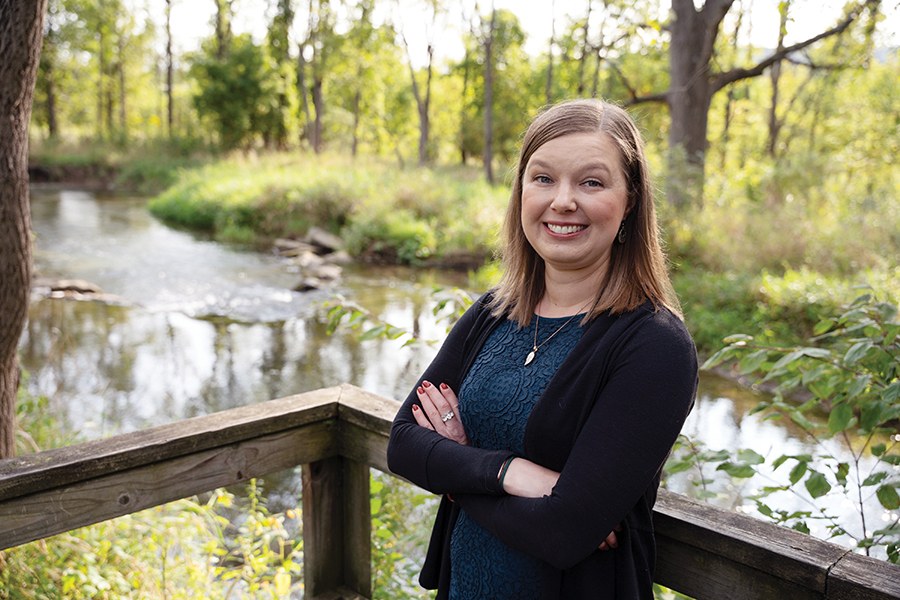Posted: January 9, 2025
The professor of agricultural and biological engineering and director of the Institute for Sustainable Agricultural, Food, and Environmental Science is passionate about protecting water resources.

Photo: Michael Houtz
I grew up in the Highlands of northern New Jersey, surrounded by acres of woods. I spent much of my childhood hiking to ponds and lakes with my father and brother, picking wild berries along the way and catching frogs, salamanders and newts. In elementary school, I joined a Kids Against Pollution club, where we promoted recycling and tested water samples. Growing up with well water and a septic tank, I learned early on the importance of protecting water, which shaped my interest in the connections between human activities and water quality.
I pursued my undergraduate studies at Rutgers, majoring in civil engineering with an environmental option. I enjoyed telling people who assumed I was studying how to build bridges that, instead, I was studying the water that flowed under them. My passion for water quality grew through collecting water samples for an internship at a consulting firm and an undergraduate research project.
I went on to graduate school at Purdue, where my research focused on how different manure types and application practices affected water quality. I designed a monitoring network to study hormone transport through a tile-drained field into an agricultural ditch network. I loved the field and lab work and took classes outside of engineering in plant science, soil genesis and biogeochemistry. Through a teaching assistantship experience, I realized I wanted to combine teaching and research, leading me to pursue a postdoctoral research position that developed my modeling and data analysis skills. One of my mentors helped me learn how to embrace a long to-do list, a perspective I still find comforting.
Throughout my career, I faced significant challenges as a woman in STEM. In high school, a teacher doubted my place in an advanced math class. In college, a physics professor questioned my ability to complete lab work without a partner. In graduate school, a professor doubted the feasibility of my research, and an adviser questioned my graduate timeline. Each time, I demonstrated my capabilities and that I belonged.
My grandfather and my father were my biggest sources of inspiration. My grandfather, a mechanical engineer at DuPont, stood up for women on his team and supported my academic pursuits. My father, an editor for CBS Radio Network, shaped my writing skills with his critiques. Tragically, I lost my father to suicide when I was 19, which had a profound impact on me. I have come to see my career as a tribute to him, and I feel his presence every time I write. In my office, I keep a photo of my father and a diploma frame my grandfather made as constant reminders of their support.
My daughter, Maya, was born when I was a postdoctoral researcher at Purdue. I started my career at Penn State with her by my side, balancing academia and motherhood. Maya inspires my devotion to my profession as a way to build a better world for her and future generations.
At Penn State, I have taught classes for the biological engineering and environmental resource management majors and conducted water quality research. Over the past decade, I have taken on various service and leadership roles and currently serve as the director of the Institute for Sustainable Agricultural, Food, and Environmental Science (SAFES). I am excited by the opportunity to truly serve all three pillars of the land-grant mission. Through SAFES, I aim to integrate research, education and extension to achieve impactful results for our stakeholders.
Stewardship of our natural resources is one of the most pressing environmental issues. The College of Agricultural Sciences can help solve these issues through excellence in education, research and extension. SAFES provides a platform to bring these pillars together, helping the college thrive and be ready to meet future challenges.
My favorite quote is from Martin Luther King Jr.: "Darkness cannot drive out darkness; only light can do that. Hate cannot drive out hate; only love can do that." This quote reminds me to face challenges with a positive and hopeful mindset and helps me set priorities when navigating difficult situations.


